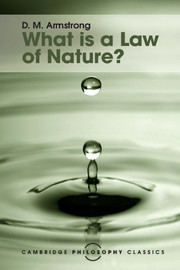Description
What is a Law of Nature?
Cambridge Philosophy Classics Series
Author: Armstrong D. M.
This book is D. M. Armstrong's influential defense of his original theory of what a law of nature is.
Language: English
Subject for What is a Law of Nature?:
What is a Law of Nature?
Publication date: 08-2016
180 p. · 15.4x22.8 cm · Paperback
Publication date: 08-2016
180 p. · 15.4x22.8 cm · Paperback
Approximative price 91.54 €
In Print (Delivery period: 14 days).
Add to cart
What is a Law of Nature?
Publication date: 08-2016
180 p. · 15.6x23.5 cm · Hardback
Publication date: 08-2016
180 p. · 15.6x23.5 cm · Hardback
Description
/li>Contents
/li>Biography
/li>
First published in 1985, D. M. Armstrong's original work on what laws of nature are has continued to be influential in the areas of metaphysics and philosophy of science. Presenting a definitive attack on the sceptical Humean view, that laws are no more than a regularity of coincidence between stances of properties, Armstrong establishes his own theory and defends it concisely and systematically against objections. Presented in a fresh twenty-first-century series livery, and including a specially commissioned preface written by Marc Lange, illuminating its continuing importance and relevance to philosophical enquiry, this influential work is available for a new generation of readers.
Preface to this edition Marc Lange; Acknowledgements; Part I. A Critique of the Regularity Theory: 1. Introductory; 2. Critique of the regularity theory (1): the problem of accidental uniformities; 3. Critique of the regularity theory (2); 4. Critique of the regularity theory (3); 5. Can the regularity theory be sophisticated?; Part II. Laws of Nature as Relations between Universals: 6. Laws of nature as relations between universals; 7. Functional laws; 8. Unsubstantiated laws; 9. Probabilistic laws; 10. Further considerations concerning the form of laws; 11. Are the laws of nature necessary or contingent?; Conclusions; Index.
Professor D. M. Armstrong (1926–2014) was one of the leading philosophers of the twentieth century and is best known for his influential work in epistemology, metaphysics and philosophy of mind. He was Challis Professor of Philosophy at the University of Sydney until his retirement in 1992.
© 2024 LAVOISIER S.A.S.
These books may interest you

Kant's Dialectic 87.76 €



